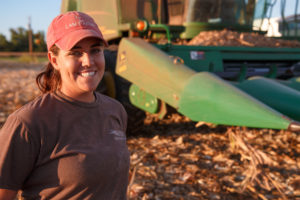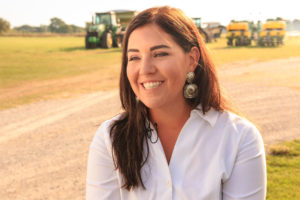 Jean Lam represents the fourth generation of her family to farm and raise livestock in Garvin County. The family operates a dry land alfalfa, corn, soybean and wheat farm while raising commercial Angus cattle.
Jean Lam represents the fourth generation of her family to farm and raise livestock in Garvin County. The family operates a dry land alfalfa, corn, soybean and wheat farm while raising commercial Angus cattle.
A love for the land and caring for livestock was instilled in Jean’s heart from an early age, but her journey to pursue farming as a profession has taken her across the country and back. Jean attended college at Stanford University and had plans to attend law school. She is a well-educated young professional who has chosen to focus her talents on the family farm – raising food for her family, her community and others around the world.
“I planned to obtain a law degree specifically pertaining to natural resource conservation. Upon completion of my bachelors, I decided that law school was not the right fit for me. It became clear that my desire to focus on natural resource conservation and make an impact for future generations could be put to use here in my very own back yard on the farm.” Jean stated.
As a diversified operation, Lam farms produces a variety of crops and livestock that work together to improve the economic opportunity for the Lam family as well as their environmental stewardship.
“It makes a lot of sense for us to come full circle with the livestock operation in conjunction with the row crops. We are able to grow the nutrients the animals need and we’re also able to create an ecosystem where each of them play into each other’s strength’s and weaknesses.” She said.
“The animals, I believe are a part of the land. They take what they need and at the end of the day they give back to it as well.” She added.
Jean is excited about the technological advancements available in agriculture and the impact they have on her family farm.
“A practice we have been participating in for about the last decade is no-till, where we minimally or not at all mechanically break the soil. If we need to reduce compaction we use plants with aggressive root systems. We are able to reduce our carbon footprint, conserve rainfall and reduce all types of runoff.” She stated.
“We use a lot of satellite technology. Precision planting allows us to use every square foot of land to its most efficient ability. We’re able to grow more bushels per acre and not drain the land of the necessary nutrients it needs for next year’s crop.” Jean added.
She believes their no-till practices and precision application of inputs work together to reduce runoff and preserve water quality.
“Water quality is very important. It’s not only important to our families and our communities; it’s also important to our livestock and our plants to get the clean water they need to grow and thrive.” She said.
Agriculture and natural resource conservation have worked hand-in-hand for multiple generations on Lam Farms.
“Natural resource conservation is very important to me and has made the opportunity for me as a fourth generation to operate and produce as much food, fuel and fiber as we do on this farm.” Jean said.
“My grandfather and my father have been heavily involved in local and state conservation districts and I have inherited a joy and an obligation to conserve our resources so I can pass them on to  future generations.” She added.
future generations.” She added.
Jean has been encouraged by the opportunities that have been available to her as a woman in production agriculture.
“Being back and being involved in the agriculture community has really shown me that there is opportunity for those who are not thought of as traditional agriculturalists to be welcomed at the table.” She said.
Ultimately, Jean believes the true measure of her success is in providing a safe product for consumers while ensuring that Lam Farms remains productive for generations to come.
“As a producer, it’s incredibly important to me from the moment I make the seed selection; to the moment I put it in the ground; to the moment it comes off my farm that I make good decisions for my family, my friends and my community. And, I continually think about the products they will be consuming and how I am raising them in a safe and sustainable way.” She said.
“The production methods we use on Lam Farms allow me to go to the supermarket or farmer’s market and confidently purchase the products that are produced on my farm or other family farms like mine.” Jean concluded.
